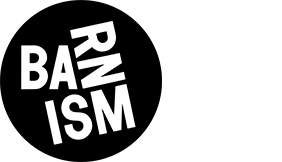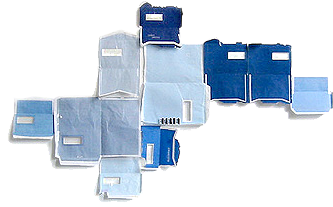From LWT South Bank Show on Francis Bacon, interviewed by Melvyn Bragg.
FB: I do believe that today, or you could say modern man, wants a sensation, really, without the boredom of it’s conveyance, or to cut down conveyance as far as possible, so that you just give over the sensation.
—————————————–
FB: You can’t any more do illustration, because it’s done so much better by the camera and by the cinema, so…you have to really concentrate on making….Not illustration of reality, but to create images which are a concentration of reality and a shorthand of sensation.
There’s this deep sea which we call the unconscious which we know nothing about, I always hope the most wonderful images will emerge from it. I believe in a deeply ordered chaos…in my work.
The images that I try to make I still at the same time want them to look very ordered.
In the very first place…When they come up you’re not in control of them, but when the image seems to emerge, then to make it, you have to control it. In painting with oils, you make an image and it’s changing all the time, and then it’s to do with your own instincts and sensibility, which turns it one way or another. That doesn’t mean that I haven’t got an overall idea of the type of thing that I would have liked to make, but I don’t know how to make it.
MB: Why are you so attracted to photographs?
FB: Well, I’ve looked at every type of photograph, of wild animals, of movement, or every type of photograph – I don’t really care what the photographs are, they just interest me, and every so often certain photographs bring up images, particularly like a lot of these photographs they’ve taken of wild animals and I suppose there is another side to that too, that the movement of animals is – the actual muscular movement probably has something to do with the structure of many things I would like to do. They are even stronger than the things that Muybridge did on movement of both the human body and of animals.
But I find that very often they are less interesting than the things that have been taken as you said just, as it were, a momentary photograph.
MB: Is that because the fact of, that is, something to do with that specific thing, is happening in that specific time, and nothing else, and there’s something about that instant inalienable fact that seems to you to be realer than anything else?
FB: Yes, you put it very clearly. I think that’s exactly what it is – there it is; it is itself, and it’s nothing else.
MB: And is there a sense that you want your paintings to have a similar….impact.
FB: Certainly, I would like to have them, I would like my paintings to have the same immediate effect that you see of this photograph of this animal after the kill.
—————————————–
MB: Why the meat, what attracted you to that?
FB: I used to think how marvellous, these extraordinary carcasses are, hanging in great butchers shops, hanging from the wall – how amazing their colour was, how beautiful they looked.
MB: You say they’re beautiful, a lot of people looking at your paintings think of them as…horror images, images of shock, images of blood and dread and not beautiful at all.
FB: Well, the thing is, what horror, what could I make to compete [with] what goes on every single day, if you read the newspapers, if you look at television, if you know what’s going on in the world – what could I do that competes with the horror that’s going on? Except that I have tried to make images of it. I have tried to recreate it and make, not the horror, but I’ve tried to make images of realism.
MB: So when we’re looking at your paintings, we’re looking at the real world?
FB: Yes, I believe you are. After all between birth and death, it’s always been the same thing there’s always been this aspect, always of, not aspect but it’s what it is – it is the violence of life.
FB: I always think that they’re images of sensation. After all what is life, but sensation? What we feel, what happens…
MB: What happens at the moment…
FB: What happens at the moment.
MB: Do you think there’s anything that exists apart from the moment?
FB: No.
—————————————-
FB: I believe in nothing. We are born and we die and that’s it – there’s nothing else.
FB: My impulse is my life, my impulse is that…I’m an old man, but I’m profoundly optimistic…about nothing.
MB: How can you be optimistic about nothing, Francis?
FB: I can be. Just existing for a moment. Exisiting today makes me optimistic.
MB: Optimistic about what?
FB: Nothing. I’m optimistic about nothing. I’m just born with that kind of optimistic nature. I’m just optimistic about nothing.
—————————————–
“Flesh and meat are life! If I paint red meat as I paint bodies it is just because I find it very beautiful. I don’t think anyone has ever really understood that. Ham, pigs, tongues, sides of beef seen in the butcher’s window, all that death, I find it very beautiful. And it’s all for sale! how unbelievably surrealistic!”
“I often imagine that the accident that made man into the animal he has become also happened to other animals – lions or hyenas for example – while man remained a primate…I imagine men hanging in butcher’s shops for hyenas, who would be dressed in fur coats. The men would be hung by their feet, or cut up for stew or kebabs.”
Francis Bacon, Exclusive interview with Francis Giacobetti, 1991-2, The Art Newspaper, June 2003.
From here.


[…] snippets from a great interview with Bacon, check out this page. And for larger images of the above works by Bacon, click on this link. […]